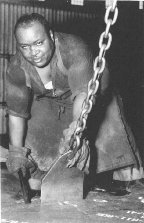Some years ago, a bunch of people burnt down some buildings in a general revolt. Some 56 people were killed, none of them cops. So much for organized confusion. But rage does as it does and is expression satisfactory enough. The riot ended. The energy was spent. And it wasn't blonde anchors, police bullhorns or national guard rifles that ceased the hostilities. It was self-control.
As is common with outbreaks of extraordinary activity, those of us with spare time to think try to explain things. Old theories are rediscovered, new ideas are tossed about. But all that is speculation. I suspect in this case the best answers are held in the minds of those that raged, then stopped raging. They had reasons to do both, many of which we will never know. But this is not their web page so, I'll go ahead and say what I think.
| Part of my extended thinking exists because of the fact that I wasn't there. Considering my own circumstances at the time, I would certainly have raged. Perhaps I would then have nothing additional to say; there would be a trashed ATM, burned cruiser, bullet-riddled helicopter or trigger-finger amputee police officer as ample testament. But the geographic distance between myself and the hostilities spared the situation additional destruction. As it was, I strolled through Brooklyn 'round about midnight, knowing the entire world was bundled in terror of my image. I have few times felt so safe from crime. On my walk, I passed the local Korean merchant. It sparked a few synapses down a familiar, if not happy trail. |  |
One of the old ideas that comes to the surface often enough to be soundly dissed and roundly supported recognizably is a particular strain of backhanded black capitalism. But what is black capitalism, and why was it proposed as an alternative to rage? The answer to the unspecific mass of questions was "Just buy the store." Like "Just grew" and "Just say no" all such admonitions end up rather unjust, if not just plain stupid. It is especially kiss-my-black-ass funny coming from self-righteous, self-appointed guardians of the black communities.
- Ujamaa (Cooperative Economics)
- To build and maintain our own stores, shops and other businesses and to profit from them together.
One such nameless guardian, worthy of much respect from his skin-color black / corporate 'capitalistic' exploits, yet profoundly lacking in Ujaama uttered such dull-witted slogans in The Aftermath. As a member of The Aftermath Committee (appointed), he dryly emoted words to the effect that the rage can be contained given ample samples of buying out.
 I must confess that I laughed with too
much cynicism to pay specific attention to the proclamations. And at this late date,
finding recommendations and accomplishments of the The Aftermath Committee are about as
likely as finding the recommendations and accomplishments of the Third Blue Ribbon
Committee. Well, at least the Third Blue Ribbon Committee produced a reasonably successful
Secretary of State. But as a certain recent celebrity murder trial revealed in a
classically ass-backward manner, racist cops continue. At this point, it would be lovely
to be able to point to the F-word cop on the short list of the Third Blue Ribbon
Committee, but as I said, nobody knows where the papers are, at least nobody on the
Internet. So it is probably not fair that we dog them too bad. It was wrong to expect
results. And while we all respect good intentions, stupid ideas remain stupid ideas, no
matter how many bodies fall dead.
I must confess that I laughed with too
much cynicism to pay specific attention to the proclamations. And at this late date,
finding recommendations and accomplishments of the The Aftermath Committee are about as
likely as finding the recommendations and accomplishments of the Third Blue Ribbon
Committee. Well, at least the Third Blue Ribbon Committee produced a reasonably successful
Secretary of State. But as a certain recent celebrity murder trial revealed in a
classically ass-backward manner, racist cops continue. At this point, it would be lovely
to be able to point to the F-word cop on the short list of the Third Blue Ribbon
Committee, but as I said, nobody knows where the papers are, at least nobody on the
Internet. So it is probably not fair that we dog them too bad. It was wrong to expect
results. And while we all respect good intentions, stupid ideas remain stupid ideas, no
matter how many bodies fall dead.
Now I have only been to a few colleges, so I don't have the last word. However, I cannot recall ever having met one black business major declaring that what they intended to do with their degree and first 50 thousand dollars was go (back?) to the ghetto and buy up the local 7-11 franchise. The emphasis is still cool. 70's cool. Integration cool. Corporate America cool. As we speak, it is not a recognizable black thang to invest 20 large into the local fruit stand. Now for the twisted critic, this brings up the dysfunctional culture question. Wrong turn. The fact is, we much prefer the black owned operated and oriented bookstore to the black grocery store. Kellogg's Corn Flakes will suffice, but not McKnowledge. In Eddie Murphy's Coming to America. Everybody laughed at John Amos' McDougals. A black capitalist, but not Ujaama.
Yet black knowledge often takes a wrong turn, as do its high-minded critics. And
despite the protestations of the Ujaamists, it doesn't take a nation of millions to hold
us back a significantly high price will work just as effectively. But, is every African American who is not engaged in Ujamaa or
Black Capitalism some kind of slave? Of course, I should be careful when I say 'us'. I
should speak about those who believe that 'each one teach one' is the principle extended
directly from Ujaama to Black Capitalism.
effectively. But, is every African American who is not engaged in Ujamaa or
Black Capitalism some kind of slave? Of course, I should be careful when I say 'us'. I
should speak about those who believe that 'each one teach one' is the principle extended
directly from Ujaama to Black Capitalism.
Let us take a trip back through time. Imagine I am a free black man in 1820 and my brothers are enslaved. I may not particularly consider them 'brothers' but I certainly, as an African in American recognize their dehumanization and my future's possibility limited by the lack of freedom in such a society. What could I do to save such an individual. Considering the dictates of those who suggest we 'just buy the store', we should, as those free of slavery, purchase their freedom. Likewise, the logic is extended to the entrepreneur. If the workingman is a slave to wages, then his freedom can be purchased as well. So if freedom is simply a matter of money, then an adequate amount of money can be gotten. So, how much does it cost?